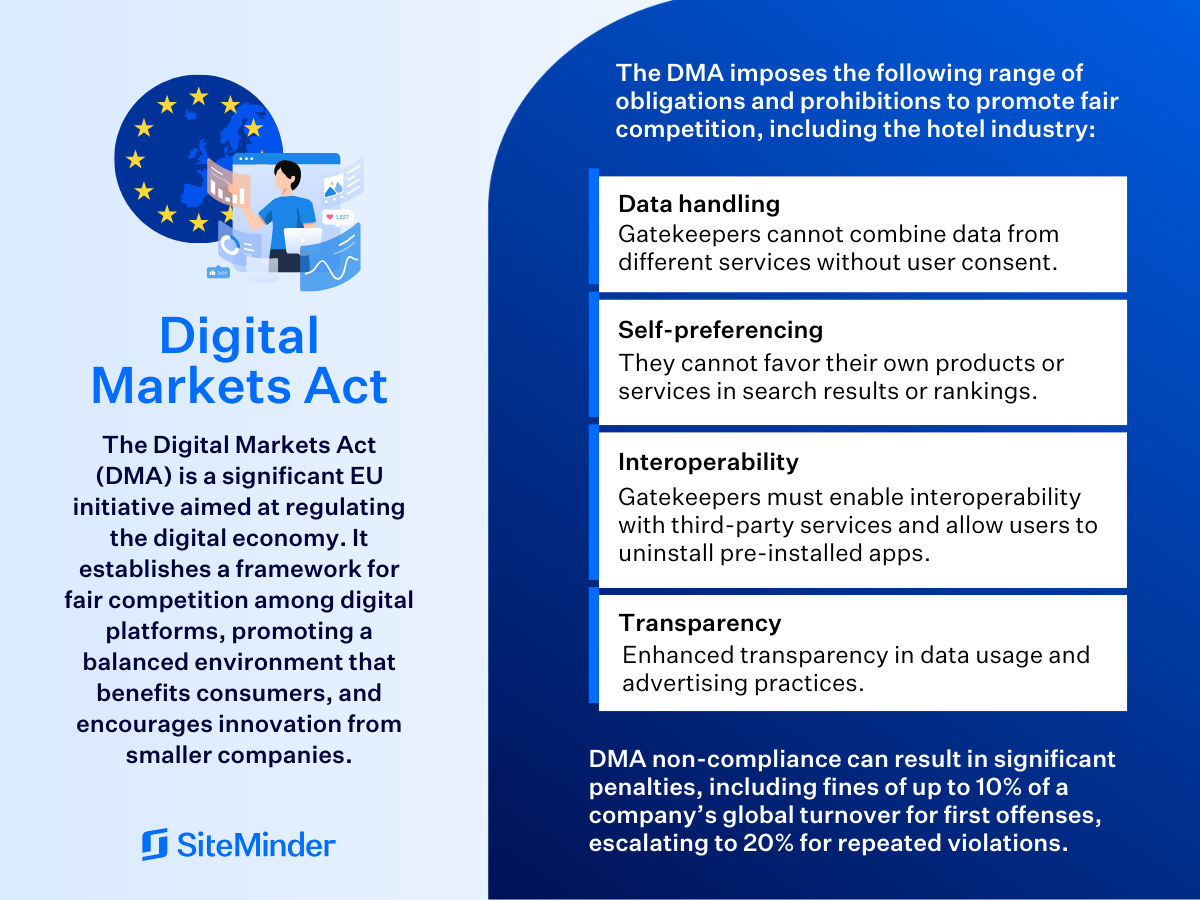What is the Digital Markets Act?
The Digital Markets Act (DMA) is a regulation within the European Union (EU) that aims to make digital markets fairer and more competitive. It applies to very large online platforms and search engines, often called ‘gatekeepers’, that have a significant impact on the digital economy.
It’s part of a wider movement to tighten regulation in the digital sector, with the EU also introducing the Digital Services Act (DSA) and proposing an AI Act.
In this blog we’ll give a full overview of the Digital Markets Act and how it might impact your hotel business.
Table of contents
Why is the EU Digital Markets Act important?
The EU Digital Markets Act is an important law for ensuring that the digital economy gives all businesses a fair chance to succeed.
Without regulation, the gatekeepers may have unrestricted power to control digital markets and freeze out other operators.
The DMA creates a more level playing field for businesses and also protects the interests of consumers. Here are some of the the main obligations and outcomes:
- Reduced anti-competitive practices: The DMA prevents gatekeepers from engaging in unfair practices like forcing businesses to use their services exclusively or favouring their own products over those of competitors.
- Promotion of interoperability: It requires gatekeepers to allow users to switch between different platforms and services more easily.
- Increased transparency: It requires gatekeepers to be more transparent about their algorithms and data practices.
- Protection of user data: Users have more control over their data and there are limits on the amount of data that gatekeepers can collect and use.
Make your digital presence count
Take advantage of digital markets and boost bookings with the help of our hotel platform, trusted by 44,500+ properties worldwide.
Learn more
How does the European Digital Markets Act work?
The European Digital Markets Act works by imposing more than 20 regulations onto designated gatekeepers which operate core platform services (CPS) and satisfy a specific criteria.
Currently the large platforms that have been designated as gatekeepers include:
- Alphabet (Google, YouTube)
- Amazon
- Apple
- ByteDance (TikTok)
- Meta (Facebook, Instagram, Whatsapp)
- Microsoft
As for the types of core platform services, they include:
- Operating systems
- Browsers
- Social networks
- Intermediation (Maps, marketplace etc)
- N-IICS (Messenger)
- Ads
- Search
- Video sharing
Designation is based on size, market power, and strategic importance, which is why not all large digital companies are included.
To fit the criteria they must:
- Have a significant impact on the internal market
- Provide a CPS which is an important gateway for business users to reach end users
- Enjoy an entrenched and durable position
Once a company has reached the necessary thresholds, they must inform the Commission within two months. The Commission will then decide if the designation is appropriate and enforce the regulations.
As well as the obligations we mentioned earlier, others include:
- Self-preferencing: Gatekeepers cannot self-preference their own products or services, giving them an unfair advantage over competitors.
- Mergers and acquisitions: Gatekeepers must notify authorities of any proposed mergers or acquisitions that could significantly reduce competition in the digital market.
- User choice: Gatekeepers must allow users to uninstall pre-installed apps and choose their default search engine and app store.
- Monitoring and enforcement: Gatekeepers must implement systems to monitor their compliance with the DMA and cooperate with regulatory authorities in investigations.
Failure to comply could result in fines of up to 10% of the company’s global turnover, or up to 20% for repeated infringements.

What is the impact of the Digital Markets Act in the hotel industry?
The impact of Digital Markets Act (DMA) in the hotel industry can be looked at in two ways; direct and indirect.
Potential direct impacts:
- Increased competition: The regulations set out in the DMA would increase competition among online travel agencies (OTAs) by limiting their ability to engage in anti-competitive practices. This could lead to more favourable terms for hotels, such as lower commissions or more transparency in pricing.
- Enhanced interoperability: If OTAs such as Booking Holdings are designated gatekeepers, they would have to promote interoperability between their platforms and others. This could make it easier for hotels to distribute their inventory across multiple channels and reduce their reliance on any single OTA.
- Data privacy protections: The DMA strengthens data privacy protections for consumers, which could benefit hotels by increasing trust and transparency in their interactions with guests.
Potential indirect impacts:
- New players: The DMA could encourage the development of new online travel platforms and services, providing hotels with more options to reach potential guests.
- Booking behaviour: As consumers become more aware of their rights and have more choices, their booking behaviour may change.
What does the Digital Markets Act mean for your hotel?
While the Digital Markets Act won’t necessarily create huge changes when it comes to running your hotel business, there are a couple of areas you may want to keep an eye on:
Rate parity
The DMA likely means the end of enforced rate parity clauses, meaning your hotel can offer exclusive discounts and promotions on your own website, without the requirement to match the rates advertised on an OTA like Expedia.
It also means OTAs may face more competition with each other to attract hotels, with more diversity in contract terms.
Search
The DMA requires large digital platforms to treat all search results fairly, preventing them from favouring their own services or those of their business partners. This could lead to more diverse and relevant search results for travellers, making it easier for hotels to display their deals and options to travellers.
There will also be greater transparency in search algorithms, requiring platforms to disclose how they rank search results.
How to respond to the DMA at your hotel
The best way to respond to the DMA at your hotel is just to stay informed. If you’re in the EU it’s especially important. However, other regions could look at the DMA and choose to implement similar legislation.
Some other tips to help:
- Review your online booking contracts: Examine your contracts with OTAs to ensure they comply with the DMA’s principles. If necessary, negotiate for more favourable terms.
- Diversify your online presence: Consider diversifying your online presence beyond relying solely on large tech platforms. This could include building your own website, utilising social media, and exploring alternative booking channels. A platform like SiteMinder can give you everything you need to succeed as a hotel business in the digital age.
- Monitor advertising practices: Stay informed about any changes in digital advertising regulations that might affect your hotel’s marketing strategies.
Frequently asked questions about the EU Digital Markets Act regulation
What does Google’s search engine results page look like before and after the DMA?
Google’s search engine results page (SERP) probably won’t change significantly in appearance before and after the DMA, since it primarily focuses on regulating the behaviour and business practices of large online platforms, including search engines. It’s unlikely to have a big impact on the algorithm.
What is the scope of the Digital Markets Act?
The scope of the Digital Markets Act includes where it operates, the sector and services it impacts, and who is responsible for complying. Right now, it is a European Union regulation that takes into account core platform services and large digital platforms known as gatekeepers. These include the likes of Apple, Microsoft, and Google.
What is the objective of the Digital Markets Act?
The primary objective of the Digital Markets Act is to promote fair competition, protect consumers, and ensure a level playing field in the digital market within the European Union.
By regulating the behaviour of large online platforms, it will address concerns about the growing power of these companies and their potential to stifle innovation and competition.
What are the benefits of the Digital Markets Act?
The benefits of the Digital Markets Act include fostering a fairer business environment, healthier competition in the digital sector, better services for consumers, more data protection and transparency, less power imbalances, and ultimately a stronger digital economy in the EU.
Who are the gatekeepers in the Digital Markets Act?
Gatekeepers under the Digital Markets Act are large online platforms that have significant market power and influence over the digital ecosystem. These platforms are considered gatekeepers due to their ability to control access to key digital services and data.
Examples include Google, Meta, Amazon, Apple, and Microsoft.
When was the Digital Markets Act proposed?
The Digital Markets Act was proposed by the European Commission in December 2020 and was formally introduced in December 2022.
What is the Digital Markets Act for social media?
The Digital Markets Act is not specific to social media but is a piece of legislation designed to regulate the behaviour of large online platforms, including social media companies.
What are the consent requirements for DMA?
The DMA does not have specific consent requirements for users. However, it does impose obligations on gatekeepers to be transparent about their data collection and processing practices and to obtain user consent for certain purposes.
So when it comes to regulations, compliance, and digital markets, how can you set your hotel up for success?
The answer lies in using smart technology…

